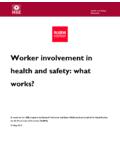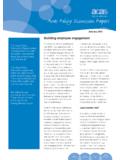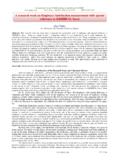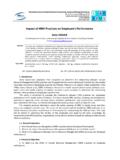Transcription of Impact Of Employee Participation On Job Satisfaction ...
1 International Review of Business Research Papers June 2007, Pp. 54 - 68 54 Impact Of Employee Participation On Job Satisfaction , Employee Commitment And Employee Productivity Komal Khalid Bhatti* and Tahir Masood Qureshi** It is widely believed that the Employee Participation may affect Employee s job Satisfaction ; Employee productivity, Employee commitment and they all can create comparative advantage for the organization. The main intention of this study was to find out relationship among Employee Participation , job Satisfaction , Employee productivity and Employee commitment. For the matter 34 organizations from Oil & Gas, Banking and Telecommunication sectors were contacted, of which 15 responded back. The findings of this study are that Employee Participation not only an important determinant of job Satisfaction components. Increasing Employee Participation will have a positive effect on Employee s job Satisfaction , Employee commitment and Employee productivity.
2 Naturally increasing Employee Participation is a long-term process, which demands both attention from management side and initiative from the Employee side. Field of Research: Human Resource Management 1. Introduction One of the leading challenges in management has been implementing effective human development strategies to enhance organizational performance and accountability. As a result of the emphasis on performance, researchers in human resource management have stressed effective human resources strategies such as job Satisfaction , team empowerment, participative management, and strategic planning. This study determines the Impact of Participation / Employee Participation on job Satisfaction , Employee productivity and Employee commitment. Since very insufficient work is done on this area in Pakistan due to limited data availability.
3 One could find many research studies on this subject but when we discuss Pakistani organizations, we are at the deep end of the research resources. The fact that employees of organizations _____ *Komal Khalid Bhatti, Business Administration Department, Mohammad Ali Jinnah University, Islamabad, Pakistan. E Mail: **Tahir Masood Qureshi, Business Administration Department, Mohammad Ali Jinnah University, Islamabad, Pakistan. E Mail: Bhatti & Qureshi 55 are becoming key to strategic decision-making seems reasonably indisputable even in Pakistani setting. In Pakistani setting Human Resources department is still facing a challenge to prove its added value to the organization s performance. They are, however, battling to justify the reasons for their existence in organizations. Perhaps one of the reasons that Human Resources department has not been more successful in communicating the importance of what they do, is because they have tended not to express it in economic terms but one can not deny the fact that by logically studying the best HR practices, an individual, team or organization may accelerate its own progress and improvement.
4 The face of traditional Human Resources services in progressive organizations throughout Pakistan is currently undergoing a dramatic change. The focus has moved from managing established traditional HR functions to providing guidance to implementing business strategy. As a result, professionals in Human Resources are increasingly challenged to take a more strategic perspective regarding their role in the organization. As Human Resources professionals respond to this challenge, measuring Human Resource s performance and its contribution to the firm s performance consistently emerge as a key theme. At the same time more and more top-level managers are realizing that HR or the people side of the business is critical to the long-term survival of the business. In the last few decades government of Pakistan is trying to make the corporate sector feasible for investment and for overall uplift of economy because organizations from different industries are playing a significant role in the economic development of Pakistan telecommunication, banking and oil & gas sector.
5 Despite their economic importance, different organizations suffer from a variety of structural and institutional weaknesses, which have constrained their ability to take full advantage from rapidly advancing process of globalization but professionally and nonprofessionally human resource management is inside in different organizations from different industries. Participatory management has to be introduced in organizations where power is shared, everyone is given an opportunity to participate, work is conducted by consensus and multidisciplinary teams are utilized to implement processes. All this demands a change in corporate culture, in which everyone must adopt the new principles and values, particularly senior managers. 2. Significance of Study This study is an attempt to explore the Impact of a human resource practice ( Employee Participation ) on job Satisfaction , Employee commitment and Employee productivity.
6 However, it is a new subject for research in Pakistan. Looking towards all research studies completed in Pakistan, it is observed that there is insignificant research work done in Pakistan and it has created a wide gap, which needs to be filled up by the present and the near future human resource management research scholars. Today s knowledge economy demands investments in human capital of the organization and to create a work environment where employees excel at their jobs but it is strongly Bhatti & Qureshi 56 perceived that practices like Employee Participation are intentionally or unintentionally ignored in Pakistan so research is the last solution to find out the truth, cause and solution. 3. Literature Review Managers who hold Human relation theory of Participation belief simply in involvement for the sake of involvement, arguing that as long as subordinates feel that they are participating and are consulted, their ego needs will be satisfied and they will be more cooperative (Richie and Miles, 1970).
7 Job Satisfaction and Employee commitment receive considerable attention from industrial and organizational psychologists, management scientists, and sociologists. Three thousand studies had been done on job Satisfaction alone by the time Locke prepared his study nearly 20 years ago (Locke, 1976). Employee Participation Employee Participation is generally defined as a process in which influence is shared among individuals who are other wise hierarchically unequal (Locke and Schweiger, 1979; Wagner, 1994). Participatory management practice balances the involvement of managers and their subordinates in information processing, decision making and problem solving endeavors (Wager, 1994). Coch and French (1949) are considered to be the pioneers in studying Employee Participation in the workplace. They developed the productivity and efficiency rationale, assuming that there is a direct link between employees involvement in decision-making and work outcomes such as the increase of job Satisfaction and productivity.
8 Participation in decision-making can satisfy employees self-actualization needs and, by doing so, increase employees motivation and job performance (Likert, 1961). These early theoretical contributions on Participation were not taken seriously until the mid-1980s when major works such as Lawler (1986) started to emerge and make some significant Impact on both academic and business circles. Another line of enquiry on participatory management is focused on its Impact on organizational outcomes such as organization performance and work outcomes, including job Satisfaction (Rooney, 1987), productivity (Rooney, 1987; Werneke and Levitan, 1994), product quality (Cooke, 1992), absenteeism (Voos, 1989) and Employee and superior relations (Cooke, 1990). Because of the different methodologies used in those studies, the results tend to be mixed (Wagner, 1994; Ledford and Lawler, 1994; Huang, 1997).
9 The best way to improve productivity is by striving for the shared goals of employees and managers. By allowing worker input into developing the mission statement, establishing policies and procedures, determining perks, etc., you can improve communication and increase morale and Satisfaction . In line with the research on Employee Participation has been emphasized in relation to job Satisfaction (Cotton et al 1988; Norton 1989). In Past studies showed that Employee Participation is positively related to performance, Satisfaction , and productivity of an Employee (Pfeffer 1994; Wagner 1994; and Verma 1995). According to Blinder (1990) Bhatti & Qureshi 57 that profit sharing programs are more effective when combined with Employee Participation in management. Job Satisfaction Locke (1976) defined job Satisfaction as .. a pleasurable or positive emotional state resulting from the appraisal of one s job or job experience.
10 That is, it is the discrepancy between what an Employee values and what the situation provides. Smith et al. (1969, p. 6) suggested that .. job Satisfaction are feelings or affective responses to facets of the situation. Dawis and Lofquist (1984) defined job Satisfaction as the result of the worker s appraisal of the degree to which the work environment fulfills the individual s needs. These definitions, as Lease (1998) pointed out, are similar to other definitions where job Satisfaction is viewed as the degree of an Employee s affective orientation toward the work role occupied in the organization. Employee Participation and Job Satisfaction Historically, management theory (Argyris 1957; Bennis 1966; Herzberg 1966, 1968; Likert 1967; Maslow 1954) has emphasized the importance of coordinating the organization-human relationship to enhance productivity and develop human capital.










